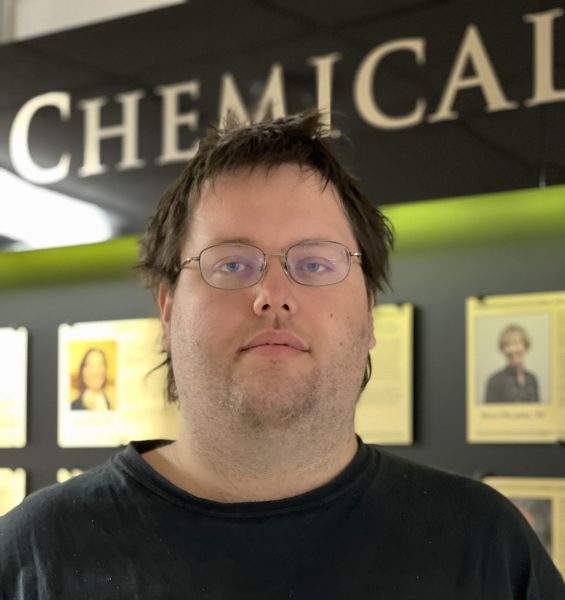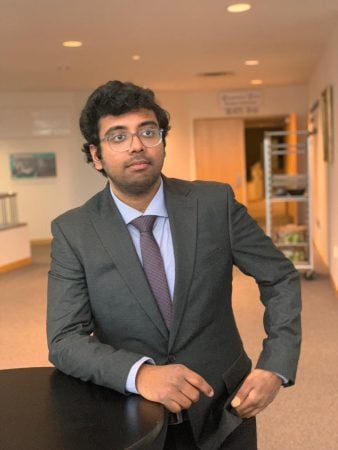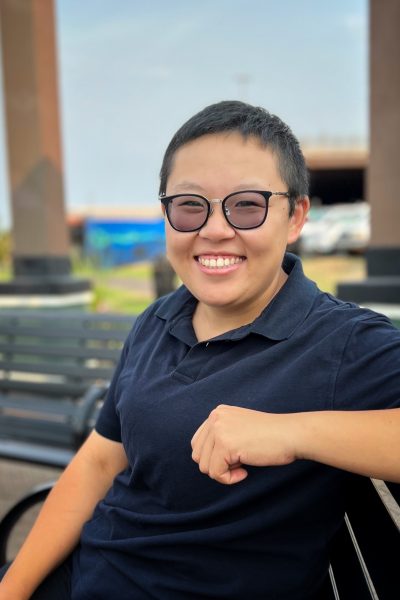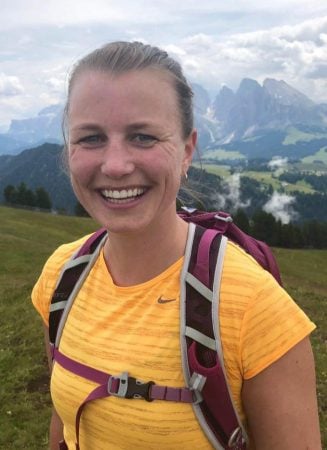I completed my B.S. (2015) and M.S. (2020) in Chemical Engineering at Michigan Technological University. As a graduate student I am completing my studies with Professor Kawatra in the Department of Chemical Engineering. My work has focused on the efficient and sustainable processing of raw and waste materials in mineral processing, which includes iron ore processing, carbon dioxide capture and utilization, and rare earth extraction from waste materials such as red mud. This work has led to several publications, including a highly cited review on the flotation of iron ores. My dissertation will build upon my master’s thesis and focus on understanding the intricacies of pelletizing iron ore to minimize waste and environmental concerns such as fine dusts.
I am grateful to Professor Kawatra and my committee for the support and guidance he has provided over my years at Michigan Tech, to my fellow graduate students under Professor Kawatra for being there to bounce ideas off of and to share insightful discussions with, and to my high school chemistry teacher who suggested Michigan Technological University to me in the first place.
I am deeply grateful and honored to receive the Finishing Fellowship Award from the graduate school and the graduate dean’s advisory panel.
My journey at Michigan Tech began in 2018 when I commenced my graduate studies. Working alongside Dr. Susanta Ghosh, I completed my Master’s thesis in 2021. The research I conducted during this time inspired me to pursue a Ph.D. I’ve since dedicated myself to exploring phase field modeling and its applications in computational fracture mechanics, as well as employing Machine Learning to solve these intricate mathematical models.
My research aims to harness machine learning techniques to streamline computationally intensive simulations across various fields such as mechanics, phase separation, and weather prediction. These models hold tremendous potential for accelerating simulations of complex material failures and other physical systems described by partial differential equations.
I express my heartfelt gratitude to the graduate school for recognizing me with the Finishing Fellowship Award. This acknowledgment serves as a driving force as I enter the final phase of my Ph.D. journey, reflecting the university’s confidence and support in my work. I extend my sincere thanks to Dr. Ghosh for the invaluable opportunity to be part of his research group. His trust and encouragement have been instrumental throughout my Master’s and Ph.D. endeavors. I’d also like to acknowledge the unwavering support of the faculty and staff of the MEEM department during my academic journey.
Once I complete my PhD I will be joining Idaho National Laboratory as a post-doctoral researcher. I am eagerly looking forward to completing my doctoral research and continuing to advance in my academic career.
I am currently a Ph.D. candidate in the Department of Mathematical Sciences starting in the Fall of 2018. My advisor is professor Qiuying Sha. Prior to joining MTU, I obtained a Master’s degree in System Theory from the School of Systems Science at Beijing Normal University (2018) and a Bachelor’s degree in Statistics from the Department of Mathematical Sciences at Heilongjiang University (2015). My research is in statistical genetics. I focus on the development of novel statistical methods and efficient bioinformatical tools to find genetic variants or genes related to complex diseases and traits, such as type II diabetes, chronic obstructive pulmonary disease, et al. One of my main projects is incorporating the genotype and phenotype association network to simultaneously analyze multiple phenotypes and multiple genotypes and improve the power to identify genes that are associated with complex diseases by using the constructed network. I also work on serval collaborative interdisciplinary projects falling in statistical genetics, RNA sequencing data analyses, clinical statistical problems, etc.
I would like to express my deepest gratitude to the Graduate Dean Awards Advisory Panel for the support, which allows me to focus on such cutting-edge research here at Michigan Tech and prepare the thesis/manuscripts for publication in the coming spring. I also want to thank my advisors Professor Qiuying Sha and Professor Shuanglin Zhang for all of their valuable guidance and support over the last four years, and I am extremely grateful to the graduate program in Math Department for their constant help and generous support throughout my entire graduate school studies.
Xuewei’s Finishing Fellowship was generously supported by the Neil Hakala Endowed Fellowship.
by John Gagnon, promotional writer
There is an old story about soft-spoken, reticent Finns.
A Swede and a Finn stand at the bar, drinks in hand.
“Cheers,” says the Swede.
“Did we come to talk or drink?” says the Finn.
Gary Kaunonen, a graduate student in the rhetoric and technical communication program, is of Finnish heritage but definitely doesn’t fit that proverbial mold. Indeed, he is effusive–in speech and writing–about a subject that is dear to his heart and mind: Finnish immigrant labor and political activity in the Keweenaw.
A native of Minnesota, Kaunonen has written a book, “Challenge Accepted: A Finnish Immigrant Response to Industrial America in Michigan’s Copper Country,” which was just published by Michigan State University Press. The book is his master’s thesis in Tech’s industrial archaeology program.
The Michigan Tech Archives will host a presentation and book signing by Kaunonen at 4 p.m., Tuesday, August 17, in the East Reading Room of the Van Pelt and Opie Library.
Kaunonen calls the book “a honed-in look” at Finnish immigrants and their living and working conditions–and often radical union activities–in the years 1904-14. The backdrop of this history, Kaunonen says, was a “lopsided distribution of prosperity” that led to “proletarian consciousness” and a “struggle for the betterment of lives.” All of it was “a powder keg” that exploded into violence on the copper range in the 1913-14 Copper Strike and the infamous Italian Hall disaster, in both of which Finns had “a huge and significant role.”
“The upstart Finnish immigrants,” he writes, “often stumbled and stammered in awkward directions, but for a time that took a back seat to working class solidarity. They seldom wavered in their bold attempt to shape their lives into what they perceived to be a more just and equal existence.”
These immigrants had marked reputations. “Finns were respected workers,” he says, “but they were also suspected agitators. They had a big impact on labor relations in this area. They resisted company dictates and mandates. They challenged the inequalities of the traditional mining and industrial society.”
His research led him to the archives at both Michigan Tech and Finlandia University, where he sought material culture–what he calls the “hard evidence” of historic circumstances. He notes, for instance, that Hancock’s leftist newspaper, Tyomies (The Worker), moved to bigger and bigger buildings and bought bigger printing presses to accommodate a burgeoning readership and a growing business. Tyomies would become a communist organ.
Kaunonen can tell the story of immigrant Finns without championing any specific cause. “I’m not casting aspersions on the mining,” he says. “But you had these huge mining companies and the vast amount of wealth and inequality they created—and then you had this little ethnic group trying to make a place for themselves. I have a soft spot in my heart for the underdog. Not that I wholly agree with everything they did, but they should certainly have a place at the table, so to speak, in telling their story.”
He went to college just to play baseball. He quit because of injuries, poked around, and worked in factories. Then the drifter became a father. “I decided I was wasting my life. I thought, well, my daughter is here, and how can I lecture her on working hard and using your gifts if I don’t do that myself. So I decided to go back to school.”
That proved to be a purposeful enterprise. He earned three bachelor’s degrees from Minnesota State University-Mankato, his IA master’s at Michigan Tech, and is now a PhD student here. Previously, he was an archivist at Finlandia. It’s been “a winding road” that has become a quest. He has now written two books on Finnish immigrants. An earlier one, “Finns in Michigan,” also was published by Michigan State University Press.
In his endeavors, Kaunonen is grateful for what he calls “a slew of good professors” in social sciences and now humanities. “They inspired me by what they did and currently do.”
As did his family.
“I write because I have an admiration for my parents and grandparents. All of them were members of the working class”—both grandfathers worked on the Minnesota iron range–“and I’m kind of honoring them and their contributions to American labor.”
Published in Tech Today.
Dear Colleagues,
As you have heard from the President Koubek, the health, safety, and security of our campus and our community is most important to us. We need to make substantial changes in how we go about our daily lives in response to the evolving COVID-19 threat. This is a rapidly changing situation so we will, no doubt, need to continuously adjust our responses as we learn more. For comprehensive and up-to-date information please see the University’s COVID-19 web page.
In response to the evolving COVID-19 situation, the Graduate School is committed to doing all we can to make the rest of the semester as healthy and productive as possible. Here are some issues the Graduate School is asking faculty to consider.
I. Research progress
Per the President’s memo, all instruction at Michigan Tech must be delivered virtually till 17 April 2020. I am sure you are wondering how this will impact progress in your research group. How should ongoing research involving graduate students be handled? This will undoubtedly vary with research group and depend on the nature of research, the need for physical presence in the laboratory, and the individual group members comfort, attitude and tolerance in this rapidly evolving situation. The Vice President for Research’s Office will be posting guidelines to help clarify general expectations soon. Please see the email from Kathleen Halverson, VPR, for additional information regarding research labs.
The University campus is not closed. Students, faculty, and staff can be on campus, and people can interact in small groups (less than 25). Under those guidelines, research and interactions among advisors, students, and staff may continue.
However, appropriate precautions should be taken and the option to continue research and research-related meetings remotely must be accommodated. In particular, remote attendance (e.g. via Zoom or Google Hangout) for group meetings among students, advisors, and staff is strongly advised. For research requiring physical presence in a laboratory, lab schedules and social distancing practices should minimize interpersonal exposure.
Please communicate with your graduate students about how you plan to organize your research group, no later than March 18. Clearly communicate your expectations and timelines with your students. Be creative with regards to how to accomplish research work, meetings, writing projects and other activities so that students make research progress in a positive educational experience.
If you have students returning from travel, please follow the university guidelines University guidelines and ask anyone who has traveled in the past 14 days to fill out the University’s Returning Travelers form. Social-distancing, self-isolation, and self-monitoring are the best ways to contain the spread of COVID-19 (Sections IV and V).
II. Defenses, research proposal examinations, and qualifying examinations
Spring (and especially mid to late spring) is a time when many graduate students schedule dissertation/thesis/report defenses, research proposal examinations and qualifying examinations. These milestones typically include a public presentation followed by an in-depth examination by the advisory committee members. Commensurate with the current policy of virtual instruction until April 17, all oral examinations and defenses must be conducted virtually (for example, via Zoom) to allow all interested to participate. Please make arrangements well in advance to accommodate this need. The student should contact IT (it-help@mtu.edu, 906-487-1111) for assistance at least 5 business days in advance to appropriately schedule staffing and potential equipment usage. The in-depth examination with some or all of the advisory committee members can be conducted face-to-face if it is agreeable to those participating.
Michigan Technological University IT Department offers Zoom (log in with Michigan Tech ID and password) for Web conferencing support. Zoom will allow you to share your screen, webcam and microphone with up to 100 participants. The IT Knowledge Base on Conferencing includes helpful information on web conferencing options and support.
III. Graduate School Emergency Fund
Funds from the Graduate School Emergency Fund is available to assist graduate students with emergencies and financial hardships.
Stay healthy and follow the guidance from the university and CDC. If you have questions or concerns, please do not hesitate to email me or Will Cantrell (cantrell@mtu.edu) or Jacque Smith (jacque@mtui.edu). The Graduate School and the University will do our best to keep you apprised as new developments occur at University’s COVID-19 web page.
With best wishes,
Dean Pushpa Murthy
Associate Provost and Dean of the Graduate School
Michigan Technological University
Houghton, MI-49931
—
This email account is monitored by staff in the Graduate School. Please reply to this email with any questions you have.
Michigan Tech Graduate School
gradschool@mtu.edu
906-487-2327 (voice)
906-487-2284 (fax)
Resources for current students:
http://www.mtu.edu/gradschool/resources-for/students/
At the Multiliteracies Center, in Walker room 107, we offer Graduate Student Writing Groups for graduate students at any level.
The groups are available for working on projects (planning and writing), proposals, conference papers, posters, presentations and defenses. They are discussion based to allow students to explain their project to other students and get feedback from peers. Evidence shows that we retain 75 – 90% of what we teach others as opposed to only 10% of what we read.
I am sincerely grateful to the Graduate Dean Awards Advisory Panel and the Dean for selecting me as a Finishing Fellowship awardee. Receiving this honor marks a joyous milestone in my PhD journey, and I am eager to embark on the final phase of my academic pursuit.
My academic journey began in Oslo, Norway, where I earned a BSc in Physiotherapy and a MSc in Sports Physiotherapy. Driven by a passion for promoting preventive health measures, I ventured into the field of Exercise and Sports Medicine. Through my Master’s thesis, I connected with my current advisor, Dr. Erich Petushek, who encouraged me to explore solutions beyond traditional Sport Medicine boundaries. This led me to a Ph.D. position in the Applied Cognitive Science and Human Factors (ACSHF) program at Michigan Technological University (MTU).
Choosing to specialize in Human Factors in Sports Medicine, I focused on preventative measures to reduce the risk of injuries and diseases. My research involves developing an exercise intervention usability scale to predict and identify barriers for intervention uptake and adherence, bridging the realms of Human Factors and Exercise/Sports Medicine.
The Finishing Fellowship is pivotal in providing the necessary support to conclude my Ph.D. journey. I express my gratitude not only for the financial support but also for reaffirming the value of the work I am passionate about. Special thanks go to my advisor, Dr. Erich Petushek, for unwavering support and guidance, my committee members, and the faculty and friends in the ACSHF program.
As I look to the future with excitement, I am eager to make meaningful contributions to the field. This fellowship reinforces my commitment to advancing research at the intersection of Human Factors and Exercise/Sports Medicine, and I am enthusiastic about the opportunities that lie ahead. Once again, thank you for this invaluable support in my academic pursuit.
The Safari Club International (SCI) Michigan Involvement Committee (MIC) is a non-profit corporation composed of representatives of each of the Michigan chapters of SCI. The Committee coordinates collaboration between SCI, its Michigan chapters, and the Michigan Department of Natural Resources and Environment (DNRE); provides scholarships and grants to graduate students; and supports other wildlife conservation and education activities deemed appropriate by the organization.
The Award
Goal: To preserve and perpetuate the right to hunt and the commitment to conservation within the wildlife profession and potential future leaders of the DNRE.
Purpose: To provide financial assistance to a graduate student, preferably one working on a DNRE-funded university research project associated with the preservation of hunting.
Fund Financing: A minimum annual fund of $3,000 has been established by SCI MIC to finance the grant program. Additional grants may be awarded if funding is available. Grant amounts may vary depending upon the number of awards and the fund balance.
Award Duration: The grant will be available for use for one year between September 1 and August 31 of the next year. An award recipient can compete for additional grants in subsequent years with other applicants. If invited by participating chapters, each selected student will be required to visit the chapter at least once during the year of the award.
How to Apply
To Be Eligible:
1) Student must be accepted or enrolled in a Wildlife or related discipline graduate program at a college or university in Michigan.
2) Must be planning a career in the Wildlife Management field.
3) Student must be familiar with hunting, hunting ethics, the role of hunting in wildlife management, and hunting’s role in society.
4) If enrolled in a MS or MA program, it must be a thesis-based degree.
Application: There is no separate application form. Please send a resume which outlines your background, along with three reference letters from individuals knowledgeable of your field skills and experience. Include your name and graduate institution where enrolled on all materials submitted. In addition, in 500 words or less, provide a response to the questions: “What should the elements of wildlife management be 20 years from now, and in what role do you see yourself?”
Selection Process: An SCI MIC committee will review application materials and select finalists. A subcommittee will interview finalists and select the award recipient(s) by September 1, 2010.
Send all materials, by June 15, 2010 to Paul Royce, SCI-Lakeshore Chapter, 9881 84th Avenue, Zeeland, Michigan 49464



